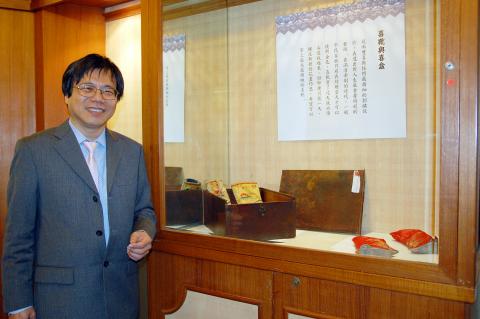A physician, who has been interested in the Chinese practice of foot binding since an early age, has put his collection of thousands of artifacts on display.
The result of David Ko’s (柯基生) endeavor over the past three decades is being exhibited through Jan. 26 at the Sansia History Museum in Sansia District (三峽), New Taipei City (新北市).
Ko said the foot-binding custom has more than 1,000 years of history in China, while it was only in the relatively modern era that Taiwan took up the practice.

Photo: Wang Kai-lin, Taipei Times
“Foot-binding was introduced to Taiwan by the occupying army of the Ming Dynasty warlord Koxinga [Cheng Chen-kung, 鄭成功] in the 17th century, but it only really spread to the common folk in the 19th century,” he said.
“In the beginning, the settlers from China were mostly poor and faced difficult living conditions in Taiwan. It was only later on when some people became prosperous, that female foot-binding became more common, especially among urban residents,” said. “At its peak, one estimate indicated that up to 70 percent of women in Taiwan had their feet bound.”
Women’s rights activists have said the custom amounts to enslaving females — giving them a life of pain and restricted movement. They have said it was the Chinese patriarchal society’s way of suppressing women — deforming their feet to satisfy a male notion of erotic desire. As such, activists have said it should not be romanticized nor promoted as some kind of fashion concept or an appealing cultural legacy.
Ko said his research showed that the Hakka, mountain Aboriginal groups and lowland Pingpu Aboriginals did not practise footbinding, but due to increased interaction with Han Chinese over the centuries, some of the groups took up the practice.
The practice resulted in what was known by the Chinese as the “three-inch golden lotus” (三寸金蓮). The Chinese inch (寸) is a little longer than 3cm so the preferred foot length was less than 10cm.
Ko said the woven and embroidered shoes used to bind feet were not as refined in Taiwan as those made in China because of the custom’s short history in the nation.
“However, there are localized differences and we do have specialty styles that are distinct from Chinese styles,” he added.
Most of the tiny shoes used to bind feet in Taiwan were various shades of red to express family bliss and vitality, Ko said.
The early migrants from the Zhangzhou and Chuanzhou regions of Fujian Province incorporated the wooden high-heel slippers from their cultures, which enclosed the bound feet and gave them a slender look, Ko said.
Ko, who has a collection of more than 6,000 pairs of the shoes, said he began to study foot-binding customs when he was about 10 and said that “it led to an interest in physiology and formed his thinking to become a medical doctor.”
Sansia District Administrator Yang Chih-hung (楊志宏) said his great-grandmother had bound feet.
“Through systematic collection, compilation and planning, the public will have a deeper understanding about this old custom,” Yang said of the exhibit.

Taiwan is to commence mass production of the Tien Kung (天弓, “Sky Bow”) III, IV and V missiles by the second quarter of this year if the legislature approves the government’s NT$1.25 trillion (US$39.78 billion) special defense budget, an official said yesterday. Commenting on condition of anonymity, a defense official with knowledge of the matter said that the advanced systems are expected to provide crucial capabilities against ballistic and cruise missiles for the proposed “T-Dome,” an advanced, multi-layered air defense network. The Tien Kung III is an air defense missile with a maximum interception altitude of 35km. The Tien Kung IV and V

The disruption of 941 flights in and out of Taiwan due to China’s large-scale military exercises was no accident, but rather the result of a “quasi-blockade” used to simulate creating the air and sea routes needed for an amphibious landing, a military expert said. The disruptions occurred on Tuesday and lasted about 10 hours as China conducted live-fire drills in the Taiwan Strait. The Civil Aviation Administration (CAA) said the exercises affected 857 international flights and 84 domestic flights, affecting more than 100,000 travelers. Su Tzu-yun (蘇紫雲), a research fellow at the government-sponsored Institute for National Defense and Security Research, said the air

A strong continental cold air mass is to bring pollutants to Taiwan from tomorrow, the Ministry of Environment said today, as it issued an “orange” air quality alert for most of the country. All of Taiwan except for Hualien and Taitung counties is to be under an “orange” air quality alert tomorrow, indicating air quality that is unhealthy for sensitive groups. In China, areas from Shandong to Shanghai have been enveloped in haze since Saturday, the ministry said in a news release. Yesterday, hourly concentrations of PM2.5 in these areas ranged from 65 to 160 micrograms per cubic meter (mg/m³), and pollutants were

Taiwan’s armed forces have established response protocols for a wide range of sudden contingencies, including the “Wan Chun Plan” to protect the head of state, the Ministry of Defense (MND) said today. After US President Donald Trump on Saturday launched a series of airstrikes in Venezuela and kidnapped Venezuelan President Nicolas Maduro, concerns have been raised as to whether China would launch a similar “decapitation strike” on Taiwan. The armed forces regularly coordinate with relevant agencies and practice drills to ensure preparedness for a wide range of scenarios, Vice Minister of National Defense Hsu Szu-chien (徐斯儉) told reporters before a